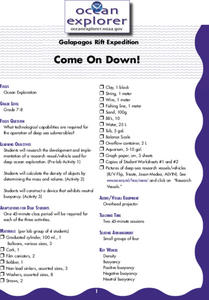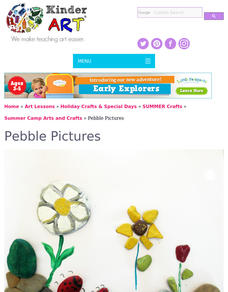Curated OER
Odyssey of Life, Part II-The Unknown World
Students complete an experiment in which they observe different natural sample in which they uncover the microbial world. They complete a two part worksheet that accompanies the lesson.
Curated OER
Science: All About Fish
Fifth graders describe the physical and behavioral characteristics of fish. In small groups, they complete fish fact sheets by filling in the missing key words. They play a "What Am I?" game by giving clues about various fish for...
Curated OER
Snail Observation Exercise
Young scholars are given a pond snail in a clear glass and asked to make observations on the snail's form and behavior. One of the key ideas is that seemly common subjects (like snails) often have surprising or interesting properties.
Curated OER
Letter A Word Search
Pupils practice their handwriting and word recognition. In this letter A activity, students identify eight words with pictures as they use lowercase letters to complete an elementary word search.
Curated OER
Life Cycle of a Frog
Students observe the life cycle of a frog. In this life cycle instructional activity, students will observe and record the changes in the life cycle of a frog.
Curated OER
Life Traps - Lesson Plan
Students observe and discuss microbes. In this microbes instructional activity students complete a lab activity where they grow microbes in petri dishes and discuss their findings.
Curated OER
Plants and Oxygen: Breathing
Second graders gain an understanding of how plants produce oxygen and that the oxygen we breathe comes from trees and plants. After a lecture/demo, 2nd graders discuss the ways plants produce oxygen and the detrimental effects of cutting...
Curated OER
Report Writing in Primary Grades
Students learn how to read a short section and parepare a sentence to share with the group. Students listen to the reading of expository text, restate, in sentence format, one fact learned from that text, and produce a report.
Curated OER
Galapagos Rift Expedition Come On Down!
Students research the development and implementation of a research vessel/vehicle used for deep ocean exploration. In this oceanography lesson, students calculate the density of objects by determining the mass and volume.
Curated OER
Sink or Swim
Young scholars define density and explain how to determine the density of an object. Students participate in a demonstration that shows the differences in the densities of different liquids and how they affect the liquid's physical...
Curated OER
The Brine Shrimp Project
Tenth graders design and conduct a laboratory investigation to determine how different factors may affect the hatching and development of brine shrimp eggs.
Curated OER
PEBBLE PICTURES
Learners paint pebbles to look like people, fish, butterflies, or birds. They glue to a background.
Curated OER
Water World Story
Fourth graders write a story about how a drop of water may have traveled to school. They design a presentation on the water cycle.
Curated OER
Density Currents
Young scholars study how fluids of differing densities interact with one another, how densities of fluids can be changed, and how density currents transport and deposit tremendous amounts of sediment in lakes and in the ocean.
Curated OER
Global Water Cycle & Heat Flow
Students experiment to discover how different variables affect the water cycle. They do hat flow experiments and construct a computer heat flow model.
Curated OER
Wish You Were Here! - Collaborative Literacy Project
Students explore videos, software and print resources to investigate the concept of community. Students write poems about their town and illustrate them for a collaborative literacy project.
Curated OER
Does a change in pH affect the growth and survival rate of aquatic plants?
Students determine if changes in pH affect the growth and survival rates of aquatic plants. They evaluate the optimal pH levels for the growth of aquatic plants.
Curated OER
Water Prism
Students using a glass prism filled with water are able to see all of the visible colors found the sunlight.
Curated OER
"Home Sweet Home?"
Students research an endangered animal's habitat, investigate the survival problems. They research the animal's zoo life. They research some programs of reintroduction and chart the pros and cons of each.
Curated OER
Bioremediation
Students design and conduct investigations that illustrate the effect bioremediation has on organic matter and determine environmental applications. They, in groups, present their findings to the class.
Curated OER
Lotic Environment
Students assemble a classroom river model as an example of a lotic system. They control and measure biotic and abiotic information for the in-class system and compare data with a lotic system in a natural environment.
Curated OER
A Rainbow Under the Sea: How Do Animals Survive in the Ocean?
Second graders, with adult help, create a PowerPoint presentation on a selected ocean animal.
Curated OER
Extraordinary Explorers
Middle schoolers, using the Internet, B41460research facts about explorers and travelers. They also state what places they have explored and share with the class.
Curated OER
Influence of the World's Ocean Currents on the Carbon C
Students, in groups, observe how the salt content and temperature of water affects the ocean currents. They also read articles and dicuss.
Other popular searches
- Aquarium Maintainance
- Aquarium Diorama
- Aquarium Field Trip
- Monterey Bay Aquarium
- Aquarium Maintenance
- Special Needs Aquarium
- Marine Aquariums
- Aquarium Trip
- Aquarium Ecosystem
- Salt Water Aquariums
- Fish Aquariums
- Aquariums Field Trip

























